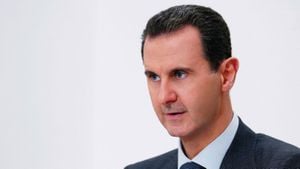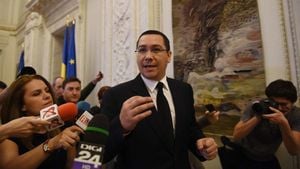Keir Starmer has signed a new defence deal with Romania, marking another significant step in his efforts to reshape the United Kingdom's relationship with the European Union post-Brexit. This agreement aims to bolster security cooperation and is part of Starmer's broader strategy to reset relations after years of uncertainty following the Brexit referendum.
The announcement came as the UK continues to navigate its place on the global stage, particularly amid concerns about potential shifts under the incoming Trump administration. The president-elect has selected Fox News presenter Pete Hegseth as his defence secretary, who previously voiced opinions against extensive American support for Ukraine's struggle against Russian aggression. The new deal with Romania highlights the UK's commitment to European security as tensions escalate due to the changing political dynamics.
Within just weeks of Starmer's government initiating this reset, the UK reached another milestone by finalizing defence agreements with Germany, the EU’s largest economy. Defence Secretary John Healey characterized the deal with Romania as evidence of how rapidly the UK's defence relationship with EU allies is developing. He stated, "This government is resetting Britain’s relations across Europe, and this agreement builds on our commitment as we deepen our ties."">
During the ceremonial signing with Romanian Prime Minister Angel Tîlvăr, held at the Ministry of Defence, discussions emphasized mutual security interests. The deal includes the establishment of a new joint defence committee aimed at collaborating on shared threats and enhancing defence cooperation. The UK and Romania have paired up to support Ukraine, with Starmer recently asserting, "The UK’s security starts in Ukraine."
Notably, Romania has already contributed to this effort by sending military personnel to the UK. This initiative is part of Operation Interflex, which has trained over 45,000 Ukrainian recruits since its inception. British military officials have noted the growing urgency of these training programs, emphasizing the pressing need for support against the backdrop of Russia's invasion.
The dynamic between the UK and Romania is set to strengthen, with both nations reaffirming their readiness to collaborate on various defence initiatives. During the meeting at Downing Street, Starmer and Tîlvăr praised the significant and historical connections between their countries, marking the cooperation as not only timely but necessary amid current geopolitical challenges.
Earlier, Starmer had met with French President Emmanuel Macron, where they both committed to positioning Ukraine “in the strongest possible position” before Trump’s upcoming inauguration. This collaboration demonstrates not just the UK’s commitment to Ukraine but also highlights efforts to maintain coordinated defence capabilities throughout Europe.
Starmer's administration is determined to revitalize the consensus on security issues across Europe, especially with new shifts anticipated under the incoming US leadership. The cooperation with Romania, as well as the prior deal with Germany, reflects this objective as European nations are poised to respond to new security challenges more cohesively.
The earlier defence deal with Germany includes operational integration between the UK's and Germany's air forces, such as using the Luftwaffe’s aircraft for various operations. Not only does this increase joint readiness, but it also establishes approximately 400 new jobs within the UK through the creation of a munitions factory.
Starmer's series of agreements across Europe aim to establish stronger defence ties as global security landscapes shift. The Prime Minister has consistently articulated his determination to mend the historically strained relationship between the UK and EU for “generations to come.”
Many experts suggest this reset is not just about restoring previous diplomatic channels but also about addressing modern security threats. The agreements made through these collaborative efforts represent proactive steps aiming to navigate the uncertainties posed by changing political climates abroad and threats on the continent.



